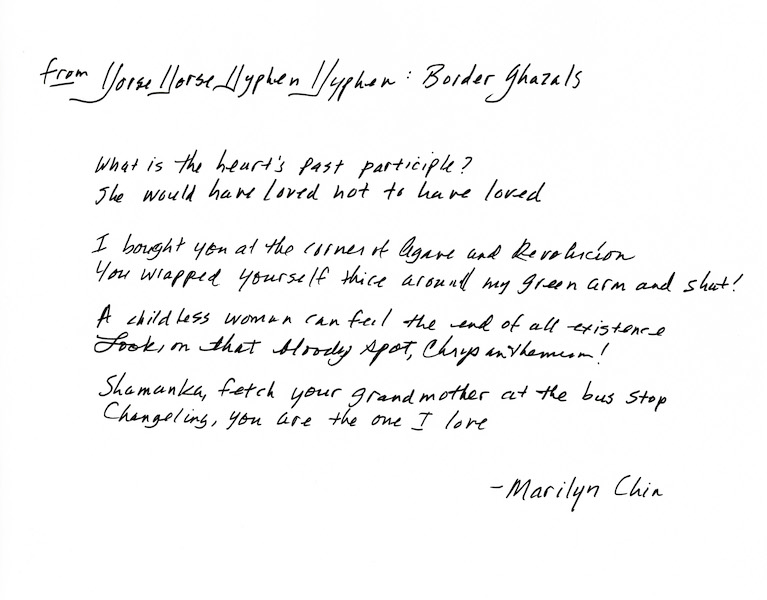After a long hiatus from school, I was working on a Master’s in literature, and just beginning to write poems of my own, when I first read Marilyn Chin’s Rhapsody in Plain Yellow. This book, with its densely allusive fabric, hyper-vivid imagery, and wild formal range, opened up my idea of what poetry can do. “Horse Horse Hyphen Hyphen,” which I wrote about extensively in my thesis, is one of the central loci for all the concerns of the book: immigration and immigrant identity, life in San Diego, at the US-Mexico border, and the border between halves of a hyphenated identity; a faithless father, violence against women, maternal love, and the loss of a mother; and the question of how or whether to change, or shapeshift, or to resist change, in the face of these many forces. The poem’s subtitle, “Border Ghazals,” describes the three sections of the poem as ghazals, and, though Chin here forgoes the form’s rhyme and repeated radif, she uses the unit of the independent couplet to create evocative juxtapositions, to cry out with wit and love and contempt and longing. In keeping with the intertextual play of the book, Chin remakes Catullus in the first ghazal’s opening couplet, “I hate and I hate, I love, I don’t know how /I’m biracial, I’m torn in two,” and Donne in the second section’s opener, “The bad conceit, the bad conceit police will arrest you / Twin compasses, twin compasses cannot come.” I’m still dazzled by the way this poem uses its form to knit together diction from so many registers, to traverse time and space, and to allow the reader to wander through the lucid web of the poem, finding connections.
What Sparks Poetry is a serialized feature in which we invite poets to explore experiences and ideas that spark new poems.
In the series The Poems of Others, we’ve invited poets to pay homage to a poem that first sparked poetry in them—a poem they read that gave them permission to write poetry or the idea that they might write it—a poem that led them down the path to becoming a poet.
Heather Green on Marilyn Chin’s “Horse Horse Hyphen Hyphen”
Writing Prompt
Write a poem in syntactically independent couplets, making meaning by accretion through the juxtaposition of the couplets. There may be an over-arching theme binding the couplets together, but they should be thematically independent to the degree that they could be moved around freely within the poem. Alter lines of poetry from at least two other poems and fold them into your poem. Alter one joke or punch line and fold it into your poem.
— Heather Green
Share This Post
Print This Post

Heather Green
Heather Green is the author of No Other Rome (Akron Poetry Series). Her poems have appeared in Bennington Review, Denver Quarterly, the New Yorker, and elsewhere. She is the translator of Tristan Tzara’s Noontimes Won (Octopus Books) and Guide to the Heart Rail (Goodmorning Menagerie). Her translations of Tzara’s work have appeared in Asymptote, Ploughshares, Poetry International, and several anthologies. She is an Assistant Professor in the School of Art at George Mason University and is a faculty member of the Cedar Crest Pan-European MFA in Creative Writing. More at https://www.heather-green.com/.



